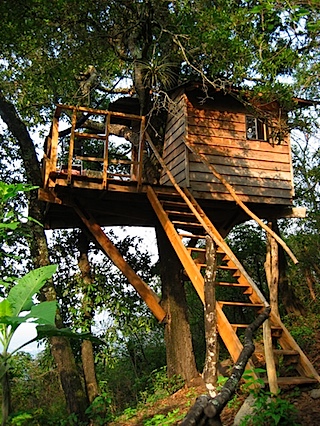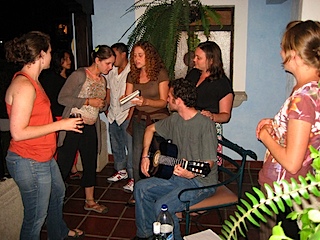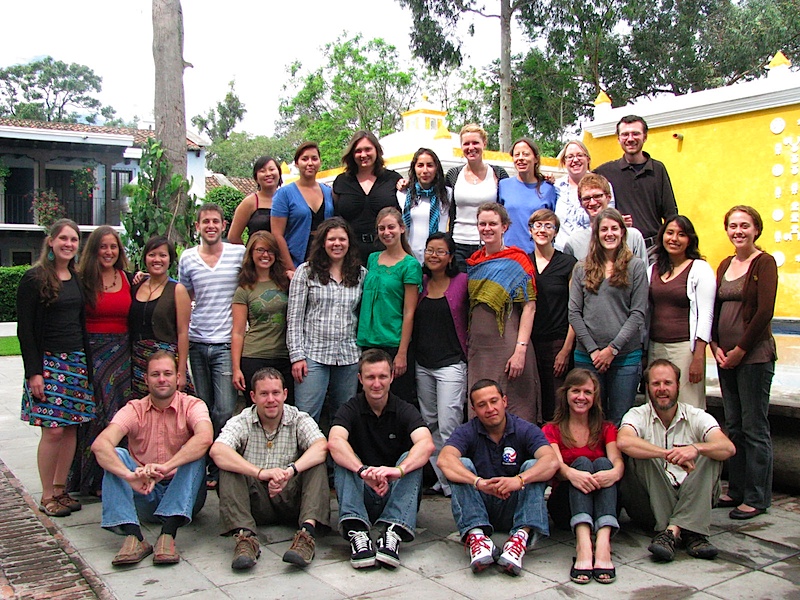Here I am, spending the night in a treehouse in the mountains overlooking Antigua. My friend Belkar saw that we’ve been having a rough week, so he suggested we treat ourselves to something nice and he’d send us a few dollars via Paypal. My friends are the best.
We just finished our COS Conference (Close Of Service; the government loves acronyms). It’s several days of seminars to bring to a close our time in the Peace Corps. The topics are retrospective, like evaluating the success of the program and how to fill out all the final paperwork, as well as preparing for the future: how to leverage Peace Corps service when applying for federal jobs, getting ready for reverse culture shock, and how to get health coverage. It’s nice that the government addresses the importance of making tidy ends; apparently in the early days of the Peace Corps they returned shell-shocked volunteers to normal society to fend for themselves, with little preparation.
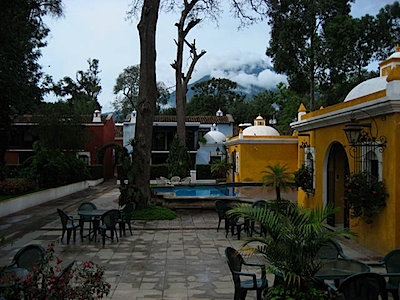 I think the best part of this week, though, is all the incidental stuff. Peace Corps put us up in a very swank hotel for the seminar, and we have all our evenings free. This is the last time all of us from our training group will be together, and we all know it. I hate goodbyes, and that’s what this is all about. After the day’s meetings, Tim broke out the guitar and we all taked and sang and enjoyed each others’ company until the wee hours.
I think the best part of this week, though, is all the incidental stuff. Peace Corps put us up in a very swank hotel for the seminar, and we have all our evenings free. This is the last time all of us from our training group will be together, and we all know it. I hate goodbyes, and that’s what this is all about. After the day’s meetings, Tim broke out the guitar and we all taked and sang and enjoyed each others’ company until the wee hours.
It all reminds me a bit of summer camp, saying goodbye to a small group of energetic, happy, skillful people that have become a surrogate family by virtue of an intense, shared experience. Back when I was a camp counsellor, we jokingly called every other Friday “Cryday”, because we would have a big closing campfire and all the kids would reminisce about the experiences they’d had, and cry buckets knowing that the end was near. Of course, at the last campfire of the summer, the counsellors were always the ones crying the hardest.
The Peace Corps is probably the most “touchy-feely” branch of the entire US government. Several of the sessions were retrospectives, where we looked back on that we’d learned and experienced, sharing our thoughts openly with each other. At one point, David Castillo, who lead our training during the first three month in Guatemala, came out to speak with us. We all smiled immediately when we saw him; we haven’t seen much of him since we swore in, but he was always there to answer questions or give advice, his voice always cheerful and unceasingly enthusiastic.
“Today, we are going to talk about shoes,” he began in his singsong accented English. “Where have your shoes been in these two years? What have they seen?” We were all thinking about the unexpected paths we’d trodden, both literal and metaphorical, as he stretched out casually on a chair in front of us. “Take for instance, these shoes…” He nonchalantly pulled up his pants, showing a classy but well-worn pair of cowboy boots. Raucous laughter broke out in all sides; we recognized them immediately as the boots* we’d pitched in to buy him as a thank-you present the day we graduated from training.
Many volunteers shared their personal stories, as well. Our group has volunteers with parents who immigrated from places like Vietnam, Cambodia, Colombia, and Bolivia. I was surprised to learn that ALL of them had to overcome negative feelings from their families about their Peace Corps service. “Why would you want to go back THERE, after all the work we did to become Americans and escape that sort of life?” they were asked. But now, after all my friends have done and seen, their families are seeing the importance of how they’ve given back to others who are less fortunate, as well as served their country as Americans. That’s one of the things I love about America: we really are a melting pot, citizens regardless of where our ancestors came from.
After that discussion, Gregorio brought out letters that we’d written to ourselves the day before we swore in as volunteers, two years ago. I laughed aloud when I read mine, and I will share it here:
July 17, 2008- S. Lucia, Guate.
Dear Jaime
I hope you were smart and focused on the “now”, especially since it will be “then” now that you’re reading this. Was Qu’anjob’al (sp) as scary as you’d feared? Did you get your Wanderings book done? Did you learn to live simpler, both mentally & physically?
I hope people from home continued to support you. Does a finish come easily (& quickly), or are you doing an extended year? It’s a shame time travel is a one-way street, as you cannot answer. But I guess it’s better this way, I don’t REALLY want to ruin the surprise.
If you are going home, please say hi to Ryan and Brian and Dave and the padres for me. Travel the US some and get reacquainted with it. It’s a good place and we should forgive some of its faults and silliness– every place has them.
That is all, you brave footsoldier of compassion*. Now go out and play, before you’re 40.
-f
I laugh because several times in the last weeks while thinking about our impending return, Emily has repeated a Mark Twain quote previously unknown to me: “You forgive a place once you leave it.”
On the last day of the conference, we met with Basilio (our boss) and broke out in to small groups to brainstorm ways to improve the program for the coming volunteers. Basilio’s command of English is modest, so we did the exercise in Spanish. He left my group at one point to go check in on another, and we kept on jabbering away.
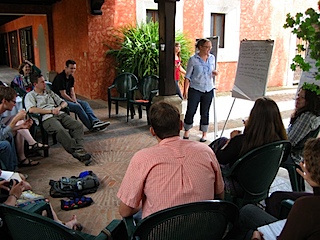 There was a pause. “Creo que es la primera vez que hablamos en Español hasta entrenamiento,” I though aloud (You know, this is the first time I think I’ve spoken to any of you in Spanish since training). Everyone laughed, realizing how far we’d really come, linguistically. A few minutes later, our groups rejoined to give presentations over their findings. Jane got up to speak for my section, and people started applauding after just a few sentences: we all remember that when she got to Guatemala, she had the lowest level Spanish of everyone and was deathly afraid of public speaking. Yet today, she gave a ten minute briefing in a foreign language with full, natural confidence. Maybe that is one of the best parts of this entire thing, seeing how far each individual has come, how much they’ve developed, how much richer they’ve become for this experience.
There was a pause. “Creo que es la primera vez que hablamos en Español hasta entrenamiento,” I though aloud (You know, this is the first time I think I’ve spoken to any of you in Spanish since training). Everyone laughed, realizing how far we’d really come, linguistically. A few minutes later, our groups rejoined to give presentations over their findings. Jane got up to speak for my section, and people started applauding after just a few sentences: we all remember that when she got to Guatemala, she had the lowest level Spanish of everyone and was deathly afraid of public speaking. Yet today, she gave a ten minute briefing in a foreign language with full, natural confidence. Maybe that is one of the best parts of this entire thing, seeing how far each individual has come, how much they’ve developed, how much richer they’ve become for this experience.
After the conference ended, Basilio and Ana Isabel (his very capable assistant) invited all of us Healthy Homes volunteers to dinner at a pretty nice restaurant in Antigua. This is not the norm, and we’re pretty sure he did this out of his own pocket. We have developed a special relationship with Basilio over the two years; he’s been very fatherly to all of us, taking a personal interest in our well-being that goes beyond the general parameters of his job requirements. We, in turn, were the first volunteers in this new program, and performed far above expectations. It was a very emotional evening.
Here I want to pay homage to all the special people that have become my family over the last two years. Many of them have appeared in the blog, a few of them have not. But they will all be forever welcome at my table.
Back Row: Thea Chun, Ana Nightingale, Jessica Vandivort, Carmen Muñoz, Aliyya Shelley, Maggie Hume, Jane Zimmerman, Tim Slattery
Middle Row: Anne Ballard, Ashley Kissinger, Lynn Nguyen, Grant Picarillo, Kelsey Field, Ellen Ostrow, Amanda Geller, Kaying Vang, Emily Fanjoy, Sarah Allen, Matt Crane, Casey Kittredge, Faviola Rubio, Kristen Petros
Front Row: Joe Busch, Zach Nosdal, Dan Grinnell, Freney Giraldo, Katy Clark, Jim Fanjoy
Not pictured: Leoti Laferriere (medically separated the week before, still received COS status)
*George W Bush called us “brave footsoldiers of compassion” in his 2008 Volunteerism Day speech we attended at the white house. We have all joked about that unfortunate wording ever since.
